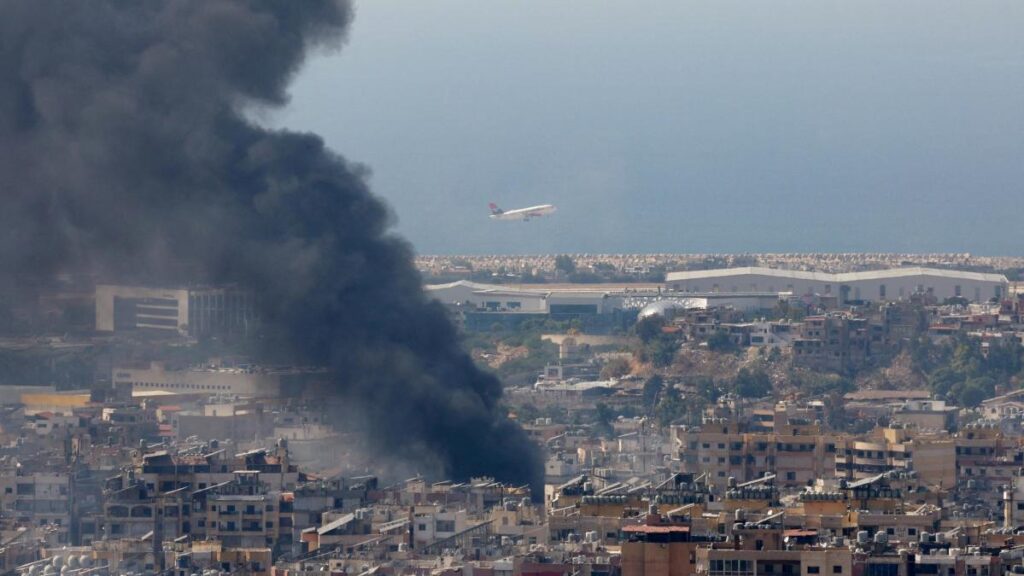Israel’s Prime Minister Benjamin Netanyahu has taken a strong stance against Hezbollah, urging the Lebanese populace to reject the militant group in order to avoid experiencing the extensive destruction and suffering currently unfolding in Gaza. His appeal was delivered amidst a backdrop of escalating military conflict, as Israel intensified its operations against Hezbollah by deploying thousands of additional troops to southern Lebanon. The Israeli Defense Forces (IDF) reported significant losses for Hezbollah, claiming to have killed around 50 members in air strikes. The toll on civilians in Lebanon has also been significant, with the health ministry recording 36 deaths and 150 injuries in just one day due to Israeli attacks. In retaliation, Hezbollah has continued its barrage of rockets directed at Israeli cities, notably Haifa, compounding the violence that has escalated since the outbreak of hostilities following the Hamas attack on Israel.
Netanyahu’s message to the Lebanese citizens emphasized the urgency of overthrowing Hezbollah to prevent Lebanon from descending into a prolonged war that echoes the horrors experienced in Gaza. He framed the conflict as detrimental not only for Israel but also for Lebanon, positing that the Lebanese people could forge a path toward peace and safety by rejecting the group’s influence. This appeals to the population came in conjunction with claims from the Israeli military that it had eliminated key figures within Hezbollah, including possibly the successor to its former leader, Hassan Nasrallah. However, conflicting reports about the status of these leaders from active military operations reveal an ongoing chaotic situation with far-reaching consequences for both armies and civilians involved.
Despite the Israeli offensive, Hezbollah has maintained a resilient front, asserting its capacity to endure and respond to Israeli military actions. Statements from Hezbollah officials indicated a firm resolve to continue their operations against Israeli targets. The group has been vocal about its ability to absorb and retaliate against the losses sustained in recent attacks, emphasizing that its operational capabilities remain intact. This defiance aligns with a broader narrative that dismisses the notion of defeat and reaffirms Hezbollah’s role as a significant military force in the region.
The recent escalation of conflict has drawn attention to the humanitarian crisis forming within Lebanon, where the war has resulted in mass displacements and significant casualties. The Lebanese government reports that approximately 1.2 million citizens have fled their homes, contributing to a dire refugee situation within the country. Many displaced individuals are subjected to harsh conditions, residing in makeshift accommodations without adequate resources. The United Nations has described the humanitarian impact of the conflict as catastrophic, highlighting issues such as food insecurity stemming from extensive land destruction and deteriorating living conditions for a significant portion of Lebanon’s population.
In addition to the airstrikes and ground operations, the Israeli military has engaged in targeted strikes on Hezbollah’s positions, particularly focusing on strategic locations in the southern suburbs of Beirut, a stronghold for the group. The loss of high-ranking Hezbollah commanders has been a consistent outcome of these strikes, prompting speculation regarding the leadership structure of Hezbollah, especially in light of recent attacks on figures like Suhail Husseini and Hashem Safieddine. Even so, Hezbollah has publicly indicated that its command and control remain robust, countering claims of debilitating losses and suggesting that their military readiness has not faltered.
As the conflict in Lebanon worsens, calls for a ceasefire have emerged, but Hezbollah’s previous conditions for cessation—linked to the Gaza conflict—remain somewhat ambiguous. The deputy leader of Hezbollah indicated political support for ceasefire negotiations, which could signal a potential shift in their position while reaffirming commitment to the resistance against Israel. Recent rocket attacks from Hezbollah targeting northern Israeli cities underscore the ongoing threat and complexity of the conflict, as both parties seem entrenched in their respective military strategies without an immediate resolution in sight. The situation continues to evolve, with significant implications for the region’s stability and humanitarian conditions.

